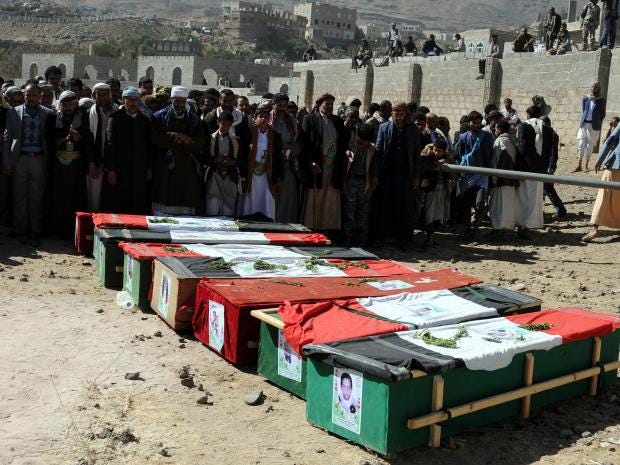
Air strikes by the Saudi-led coalition killed 68 civilians in just one day, the United Nations’ humanitarian coordinator in Yemen has said, condemning such “indiscriminate” attacks in an “absurd and futile war”.
Strikes on two sites on 26 December took the total civilian death toll from air strikes in the last ten days to 109, in addition to 75 people who have been injured.
The UN accused the coalition of showing “complete disregard for human life” in an unusually direct criticism of the war in which the Saudi-led coalition, backed by the United States, Britain and others, is fighting Iran-allied Houthi rebels.
According to the organisation’s human rights office, one of the strikes hit a crowded public market in the Taiz governorate in the country’s south-west, killing 54 civilians and injuring 32 more. Eight children were among those killed.
The UN said residential areas of the province, including a health centre occupied by refugees, have been subjected to a full blockade imposed by Yemeni authorities and “indiscriminate shelling” that caused casualties and forced many families to flee.
A second air strike on a farm in the Hodeidah governorate reportedly killed 14 members of the same family.
Jamie McGoldrick, the UN’s humanitarian coordinator for Yemen, said he was “deeply disturbed” by the “escalated and indiscriminate” attacks being carried out by the Saudi-led coalition, which includes the United Arab Emirates and is backed by the UK, the US and others.
He said: “These incidents prove the complete disregard for human life that all parties, including the Saudi-led coalition, continue to show in this absurd war that has only resulted in the destruction of the country and the incommensurate suffering of its people, who are being punished as part of a futile military campaign by both sides.
“I remind all parties to the conflict, including the Saudi-led coalition, of their obligations under International Humanitarian Law to spare civilians and civilian infrastructure and to always distinguish between civilian and military objects.
“As the conflict in which civilians have borne the brunt marks 1000 days, I once again remind all parties that it has no military solution. There can only be a political solution.”
Estimates at the total death toll in Yemen stand at well over 10,000. More than 20 million people are said to be in need of humanitarian aid, including 14 million who are lacking clean water facilities. Seventeen million people are short of food and outbreaks of cholera have claimed thousands of lives.
The conflict began soon after the Iran-backed Houthi rebels seized power in Yemen in January 2015. They are opposed to Yemen’s internationally-recognised but exiled president, Abdrabbuh Mansour Hadi, who has the backing of the Saudis. The conflict is now widely seen as a proxy war between Saudi Arabia and Iran.
The number of air strikes in Yemen has increased in recent days following an attempted rocket attack by the Houthis on the Saudi capital, Riyadh, on 19 December. Saudi Arabia intercepted the missile and accused Iran of providing the weapon to the Houthis – a suggestion that was endorsed by the US.
The Saudis have also imposed a blockade on Yemen’s ports, but facing mounting international criticism, Saudi authorities said last week they would allow humanitarian supplies, including fuel, to enter Yemen via the port of Hodeidah.







